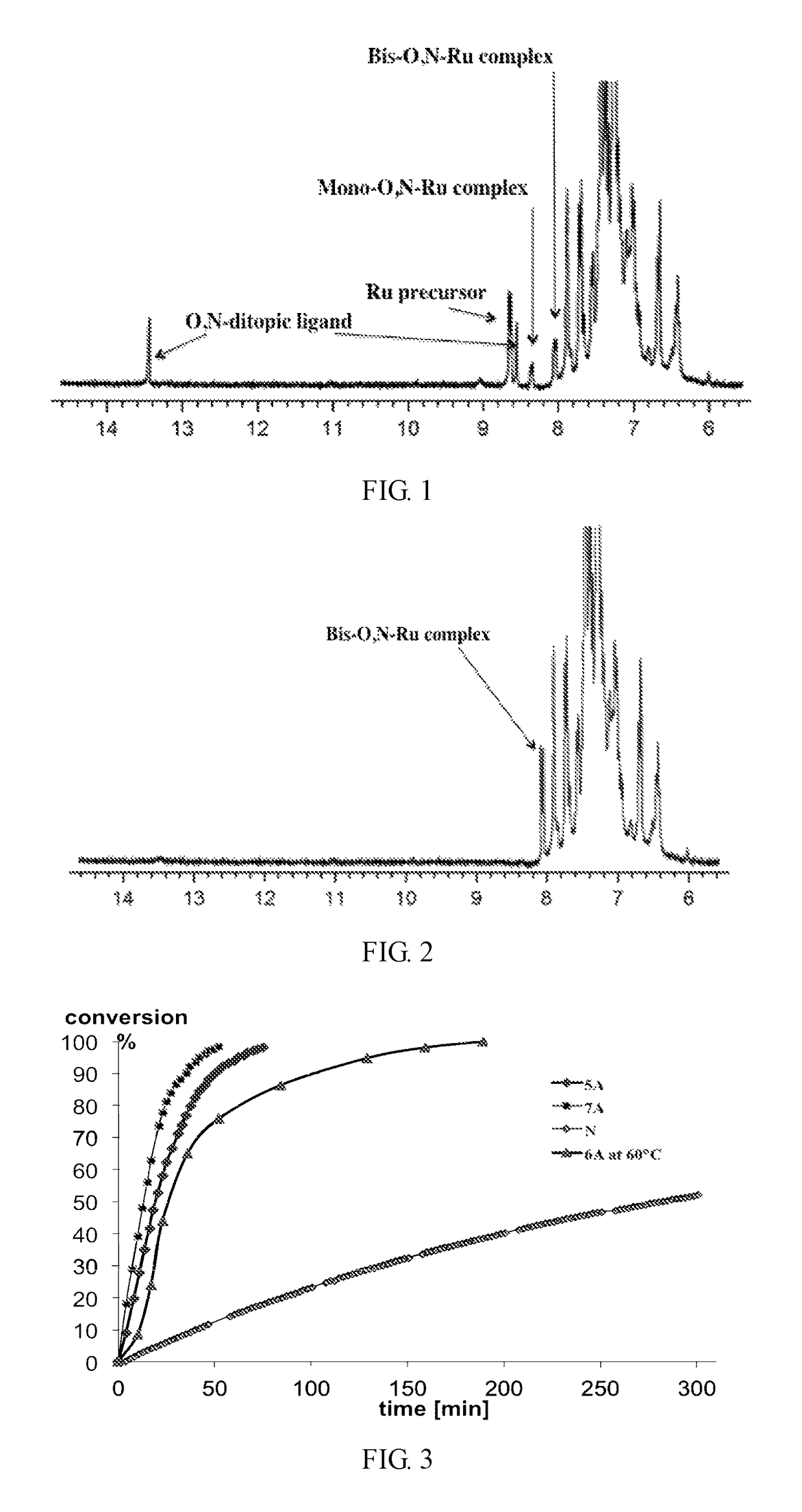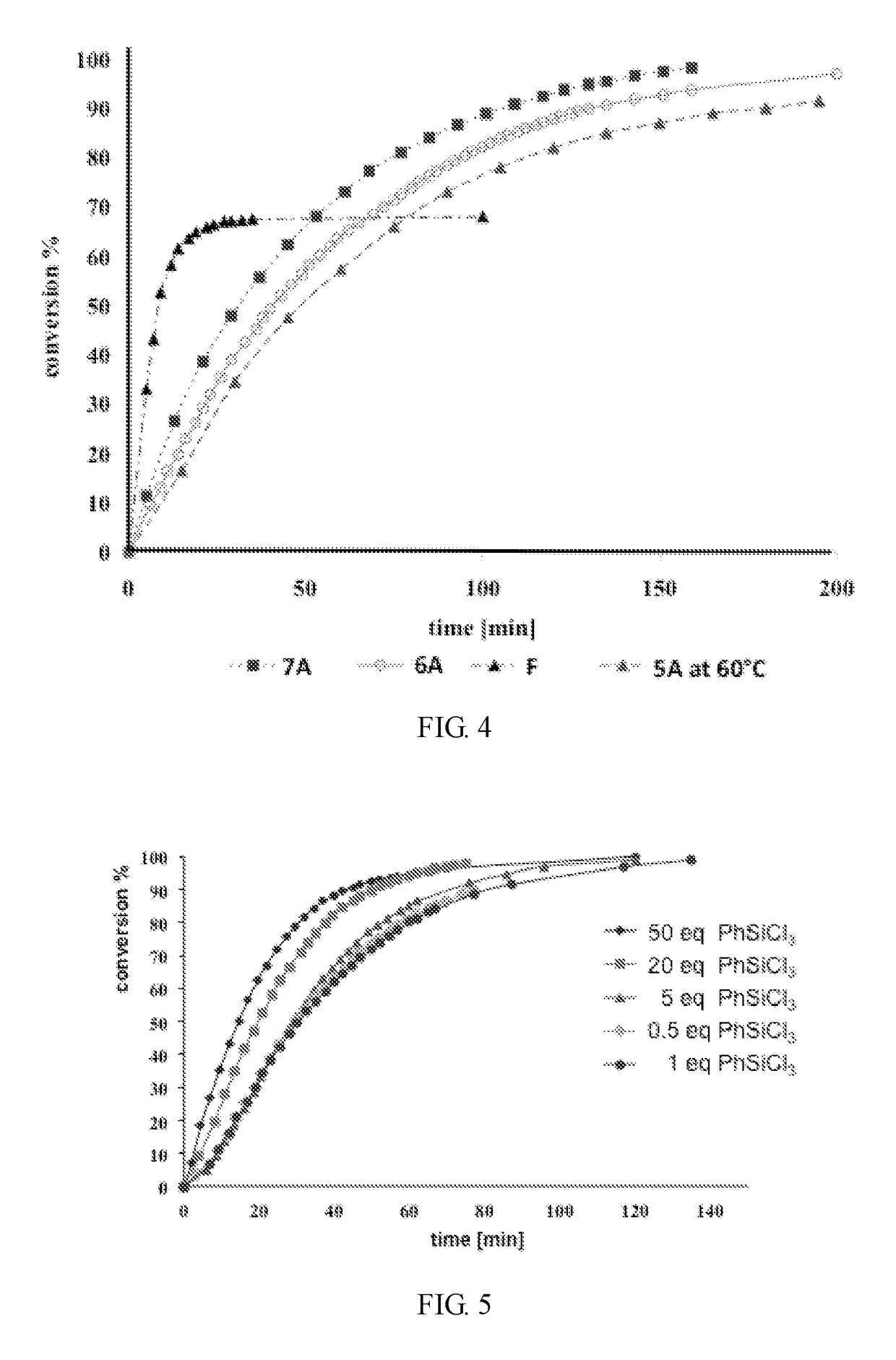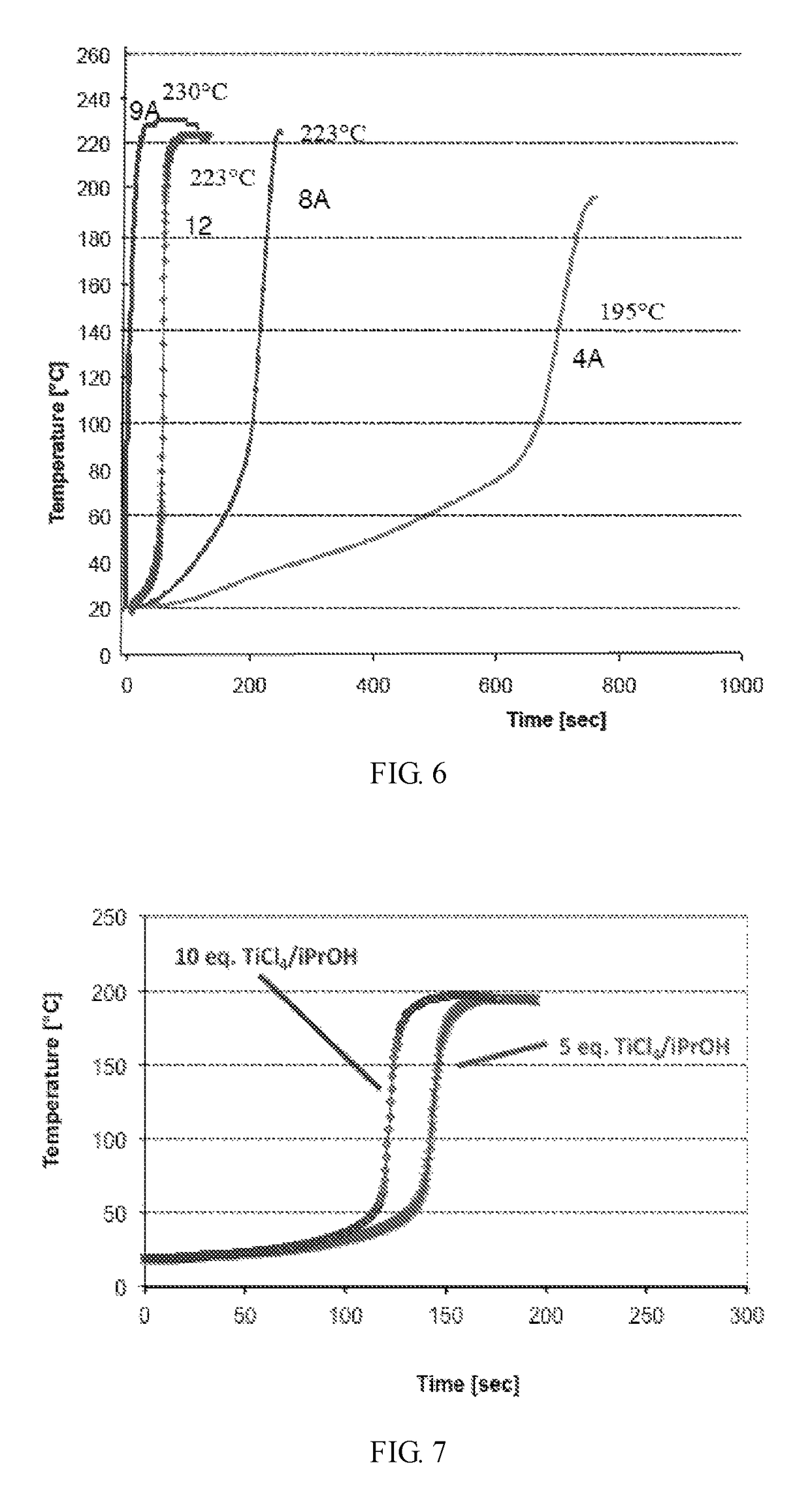Group 8 transition metal catalysts and method for making same and process for use of same in metathesis reaction
a transition metal catalyst and metal catalyst technology, applied in the field of group 8 transition metal catalysts and methods for making same and process for using same in metathesis reaction, can solve the problems of reduced propagation rate, ineffective internal olefins containing functional groups, and inability to achieve the effect of reducing propagation rate, easy preparation, and easy tunable performan
- Summary
- Abstract
- Description
- Claims
- Application Information
AI Technical Summary
Benefits of technology
Problems solved by technology
Method used
Image
Examples
example 1
2-[(4-bromo-2,6-dimethylphenylimino)methyl]-4-nitrophenoxy (PCy3)(3-2-methylphenyl-5-methyl-inden-1-ylidene)Ru(II)Cl (1F)
Synthesis of (PPh3)2Cl2Ru(3-2-methylphenyl-5-methylinden-1-ylidene) (1D)
[0230]
Step 1: Bis(2-methylphenyl)methanone (1A)
[0231]To a solution of 2-bromotoluene (2 eq., 2.6 ml, 21.79 mmol,) in 26 ml diethyl ether at −90° C., t-BuLi (1.9 M in pentane) (3 eq., 32.7 mmol, 17.2 ml.) was added drop wise. The solution was stirred for 30 min. at room temperature, followed by drop wise addition of N,N-dimethylcarbamoyl chloride (1 eq., 1 ml, 10.9 mmol), the reaction mixture was stirred for another 3 hours. The crude reaction mixture was quenched using 35 ml 1N HCl and diluted with diethyl ether. The organic phase was washed with water and the aqueous phase was extracted twice with diethyl ether, thereafter the ether fractions were combined and dried with anhydrous MgSO4. Removal of MgSO4 by filtration followed by purification using flash column chromatography (silica gel, hex...
example 2
Synthesis of (S-IMes)(2-[(2-methylphenylimino)methyl]-4-nitrophenoxy) (3-2-methylphenyl-5-methyl-inden-1-ylidene)Ru(II)Cl (2B)
Step 1: Synthesis of (S-IMes)(PCy3)Cl2Ru(3-2-methylphenyl-5-methyl-inden-1-ylidene) (2A)
[0254]
S-IMes=saturated 1,3-bis(mesityl)-imidazolidine-2-ylidene (1,3-Bis(2,4,6-trimethylphenyl)-2-imidazolidinylidene)
[0255]A 10 mL vial was charged with (PCy3)2Cl2Ru(3-2-methylphenyl-5-methyl-inden-1-ylidene) (1 eq., 0.3804 g, 0.4 mmol) and 5-IMes (1.1 eq., 0.134 g, 0.44 mmol). Dry toluene (3 ml) was added under inert atmosphere. The mixture was vigorously stirred at 50° C. for 30 minutes and dried under vacuum followed by addition of 10 ml isopropanol. After filtration and washing (two times 5 ml isopropanol), an orange powder was obtained; 0.33 g (Yield: 84%). The product was characterized by NMR spectra 1H, 13C, and 31P.
[0256]1H NMR (300 MHz, CDCl3, TMS): δ 8.47 (d, 1 H), 7.44 (dd, 1 H), 7.20-7.28 (m, 2 H), 7.04-7.11 (m, 3 H), 6.99 (d, 1 H), 6.93 (s, 1 H), 6.88 (d, 1 H...
example 3
(S-IMes)(2-[(2-chlorophenylimino)methyl]-4-nitrophenoxy) (3-2-methylphenyl-5-methyl-inden-1-ylidene)Ru(II)Cl (3A)
[0264]
[0265](Simes)(PCy3)Cl2Ru(3-2-methylphenyl-5-methylphenyl-inden-1-ylidene) (0.51 mmol) and 2-[(2-chlorophenylimino)methyl]-4-nitrophenol (0.51 mmol) and silver(I) oxide (0.32 mmol) were added to a Schlenk flask under argon. Dry THF (20 mL) was transferred to the Schlenk flask and then heated (40° C.) and stirred for a period of 4 h followed by cooling to room temperature. The white precipitate of PCy3AgCl (byproduct) and excess of AgO2 was removed by filtration. The filtrate was collected in a Schlenk flask and the solvent was removed by evaporation under reduced pressure.
[0266]The reaction mixture was investigated on 1H and 31P NMR, which revealed quantitative transformation to complex 3A.
[0267]Characteristic values of 1H: H—C8: 8.33 ppm (d, 1H). (no 31P NMR peak present in the complex)
[0268]The isolated solid residue provided the catalyst in 87% yield.
PUM
| Property | Measurement | Unit |
|---|---|---|
| molar ratio | aaaaa | aaaaa |
| time | aaaaa | aaaaa |
| temperature | aaaaa | aaaaa |
Abstract
Description
Claims
Application Information
 Login to View More
Login to View More - R&D
- Intellectual Property
- Life Sciences
- Materials
- Tech Scout
- Unparalleled Data Quality
- Higher Quality Content
- 60% Fewer Hallucinations
Browse by: Latest US Patents, China's latest patents, Technical Efficacy Thesaurus, Application Domain, Technology Topic, Popular Technical Reports.
© 2025 PatSnap. All rights reserved.Legal|Privacy policy|Modern Slavery Act Transparency Statement|Sitemap|About US| Contact US: help@patsnap.com



